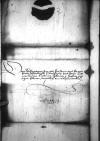Letter #4656
Gdańsk Town Council to Ioannes DANTISCUS & Tiedemann GIESEGdańsk (Danzig), 1546-10-22
| received Heilsberg (Lidzbark Warmiński), 1546-10-25 Manuscript sources:
Auxiliary sources:
| ||||||||||
Text & apparatus & commentaryPlain textText & commentaryText & apparatus
Denn hochwirdigen inn Gott Furstenn und Herrnn, / herrn
Hochwirdige inn Gott Furstenn, Gennedige Herrnn. /
Unsere willige und angenehme dienste / seint E(wer) H(ochwirdigste) G(nade)n zu ider zceit bevorahnn entpholenn. /
Genedige Herrnn. /
E(wer) H(ochwirdigste) G(nade)n cf.
Davon wir / wo es E(wer) H(ochwirdigste) G(nade)n also gelegenn / eine abeshrifft / woll und gerne habenn muchtenn / und thuen uns hirmit E(wer) H(ochwirdigste) G(nade)n befhelenn / die Gott lange inn gutter gesuntheit unnd glucklicher wollfarth enthalten welle. /
Dat(um)
E(wer) H(ochwirdigste) G(nade)n dinstwillige


 AAWO, AB, D.97, f. 132v
AAWO, AB, D.97, f. 132v